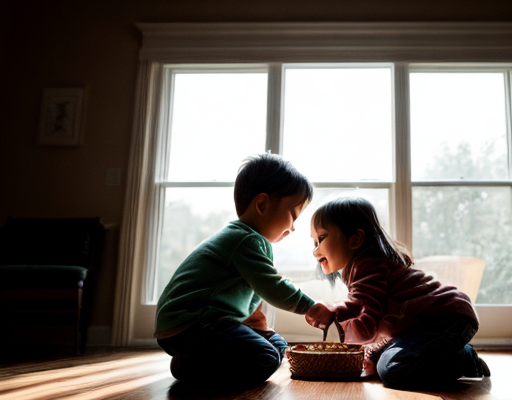
Fostering Positive Sibling Relationships
“`html
Fostering Positive Sibling Relationships
Introduction to Sibling Dynamics
Sibling relationships are one of the most enduring bonds that individuals form over their lifetimes. These relationships can provide support, companionship, and a unique form of love. However, they can also involve competition, rivalry, and conflict. Understanding how to foster positive relations between siblings is crucial for their emotional development and family harmony.
The Importance of Early Bonds
Establishing a positive relationship between siblings begins in early childhood. It is important for parents to nurture a safe environment where older siblings view the arrival of a new family member as a positive event. Early interaction and shared activities can lay the groundwork for strong sibling connections.
Encouraging Empathy and Understanding
Teaching siblings to express and respond to each other’s feelings can increase empathy and understanding. Parents can facilitate this by modeling empathetic behavior and encouraging siblings to talk about their emotions and perspectives.
Setting Boundaries and Resolving Conflicts
Conflict is a natural part of any relationship. Parents can help siblings develop conflict-resolution skills by setting clear boundaries and teaching them how to negotiate and compromise. Guiding them through disagreements constructively is key to building lasting relationships.
Fairness and Individuality
Every child has a unique personality and set of needs. Emphasizing fairness and recognizing individuality, rather than enforcing strict equality, lets siblings feel valued for who they are. Parents should also be mindful of comparing siblings, as this can lead to resentment.
Collaborative Activities and Teamwork
Engaging siblings in collaborative activities can promote teamwork and reinforce their bond. Whether it’s through a shared hobby, sports, or cooperative games, working towards a common goal can teach valuable lessons about cooperation and support.
Creating Family Traditions and Memories
Family traditions and shared experiences can create fond memories and strengthen sibling relationships. Parents can foster these connections by organizing family outings, holiday traditions, and regular family meetings where everyone has a voice.
Supporting Healthy Competition
While competition between siblings can foster ambition and motivation, it’s important for parents to keep it healthy and positive. Celebrating each child’s achievements, regardless of the outcome, helps to prevent rivalry from turning negative.
Promoting Open Communication
Open lines of communication are essential in any relationship, and siblings are no exception. Encourage transparent communication between siblings and teach them to express themselves in an assertive yet respectful manner.
Praise, Attention, and Reward Systems
A system of praise and rewards that acknowledges personal efforts, rather than outcomes, can motivate siblings to support each other’s successes. Attention should be distributed evenly to avoid feelings of neglect.
Role of Parents in Modelling Relationships
Parents play a critical role in modeling positive relationship behavior. How parents interact with each other and with each child sets a foundation for how siblings treat one another. Demonstrating respect, love, and cooperative interaction is invaluable.
Independence and Time Apart
While fostering togetherness is important, it’s also crucial to allow siblings their own space and time for individual pursuits. This helps reduce conflict and allows each child to develop their sense of identity.
Dealing with Sibling Jealousy
Jealousy is a common issue that can lead to sibling rivalry. Address these feelings openly and help siblings understand that while terms may not always seem fair, each child is loved and valued for who they are.
Teaching Siblings to Share
Sharing is a fundamental aspect of relationship building. Parents can teach the importance of sharing by setting a positive example and creating opportunities for siblings to practice sharing in their daily interactions.
Positive Reinforcement and Recognition
Recognizing and reinforcing positive interactions between siblings encourages continued good behavior. Parents should be quick to acknowledge acts of kindness and cooperation among their children.
Monitoring Sibling Interactions
While giving children space to grow independently is important, parents also need to monitor interactions to ensure they remain healthy and respectful. Intervening when necessary is part of guiding siblings towards positive relationships.
Education on Family Roles and Dynamics
Help siblings understand their roles within the family and the dynamics that come with it. An awareness of how each person contributes to the family can foster a greater appreciation and respect for one another.
Adaptability and Changes in Sibling Relationships
Sibling relationships naturally evolve over time as children grow and personal situations change. Parents should be adaptable and support their children through these transitions, fostering a supportive environment regardless of the circumstance.
Nurturing Lifelong Sibling Bonds
Ultimately, the goal is to nurture sibling relationships that will last a lifetime. With patience, understanding, and the right approach, parents can help their children build unshakeable bonds that will provide comfort and support throughout their lives.
Conclusion
Fostering positive sibling relationships is a multifaceted and ongoing process that requires attention, patience, and consistency. By cementing a foundation of love, respect, and shared experiences, parents can help their children develop bonds that not only enrich their childhood but also provide a pillar of support throughout their adult lives.
“`

